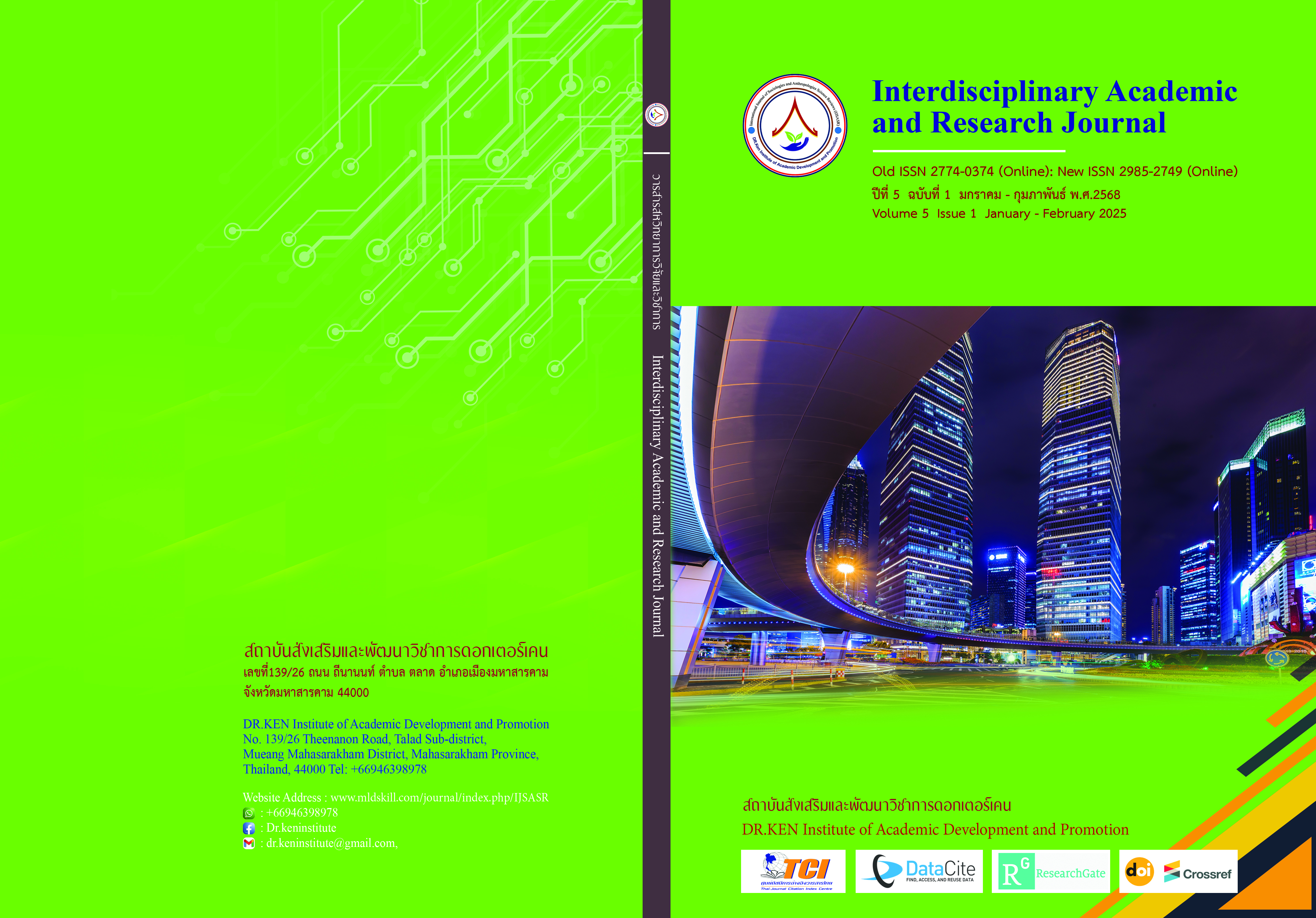Development of a Program to Promote the Ability to Organize Teaching and Learning at the Lower Secondary Level for Monks Teaching Morality
DOI:
https://doi.org/10.60027/iarj.2025.279838Keywords:
Morality teaching monks, Ability promotion program, Learning managementAbstract
Background and Aims: n-school morality teaching monks are part of the important mission of academic services that aim to be a center for providing academic services in Buddhism with quality, standards, and results in children and youth having true knowledge of Buddhism and morality. The objectives of this research are: 1) to develop a program to promote the ability to manage teaching and learning and 2) to study the results of using the program to promote the ability to manage teaching and learning at the lower secondary level for morality teaching monks.
Methodology: The research and development process is divided into 2 phases: Phase 1: To study the basic information and development of a program to promote teaching and learning ability and Phase 2: To experiment with the program to promote the ability to organize teaching and learning among sample groups in Phase 1, including the sample groups used in Phase 1 of the research to study basic information. The sample group consisted of moral teaching monks under the Buriram Secondary Educational Service Area Office. The sample size was determined according to the Krejcie and Morgan table of 214 monks and the sample group used in the interviews, numbering 20 people, was obtained by purposive sampling. The sample group was used in phase 2 of the research to test the program, numbering 30 people. The tools used to collect data include questionnaires, interviews, conformity and suitability assessments, tests, and satisfaction questionnaires. Statistics for data analysis include percentages, means, standard deviations, and t-test dependent statistics.
Results: The results of the research found that 1) The present condition and the need to increase the learning management ability of morality teaching monks are at a moderate level, with the need to enhance competency, namely self-study and workshops. The program to increase the learning management ability of the moral monks consists of 5 components: (1) principles of the program (2) aims of the program (3) content and activities of the program (4) formats and activities used in the program, and (5) measurement and evaluation. 2) The program evaluation results found that it was appropriate. It has the highest level of usefulness and feasibility in every aspect. 3) Results of using the developed program. The test scores for learning management knowledge after development were significantly higher than before development at the .01 level. The level of competency in learning management after participating in the development program was at the highest level, and was at the highest level of satisfaction in participating in the program. Conclusion: The present condition and the need to increase the learning management ability of morality teaching monks are at a moderate level, with the need to enhance competency, namely self-study and workshops. Those who receive development have knowledge in learning management. After development was significantly higher than before development at the .01 level. There was a level of competency in learning management. at the highest level and were at the highest level of satisfaction in participating in the program
References
กาญจนา จันทะโยธา (2560). การพัฒนาโปรแกรมพัฒนาครูด้านการจัดการเรียนรู้ สำหรับสถานศึกษา สังกัดสำนักงานเขตพื้นที่การศึกษาประถมศึกษาร้อยเอ็ด เขต 3. วิทยานิพนธ์ ปริญญาการศึกษามหาบัณฑิต สาขาวิชาการบริหารการศึกษา คณะศึกษาศาสตร์ มหาวิทยาลัยมหาสารคาม.
จารึก ทองฤกษ์. (2552). การศึกษาพัฒนาบุคลากรของผู้บริหารโรงเรียนประถมศึกษา สังกัดสำนักงานการ. ประถมศึกษาจังหวัดสงขลา. ปริญญานิพนธ์การศึกษามหาบัณฑิต สาขาการบริหารการศึกษา: มหาวิทยาลัยทักษิณ.
ไฉไลศรี เพชรใต้. (2563). การพัฒนาโปรแกรมเสริมสร้างสมรรถนะการจัดการเรียนรู้ของครูประถมศึกษา สังกัดสำนักงานคณะกรรมการการศึกษาขั้นพื้นฐาน. วิทยานิพนธ์การศึกษาดุษฎีบัณฑิต สาขาวิชาการบริหารและพัฒนาการศึกษา: มหาวิทยาลัยมหาสารคาม.
บุญชม ศรีสะอาด, (2554). การวิจัยเบื้องต้น. พิมพ์ครั้งที่ 8. กรุงเทพฯ: สุวีริยาสาส์น.
ปนิดา บูราณรมย์. (2563). การพัฒนาโปรแกรมพัฒนาครูด้านการจัดการเรียนรู้สำหรับสถานศึกษา สังกัดสำนักงานเขตพื้นที่การศึกษาประถมศึกษามหาสารคาม เขต 1. วิทยานิพนธ์การศึกษามหาบัณฑิต สาขาวิชาการบริหารและพัฒนาการศึกษา: มหาวิทยาลัยมหาสารคาม.
ประสาท เนื่องเฉลิม. (2560). วิจัยการเรียนการสอน. พิมพ์ครั้งที่ 2. กรุงเทพฯ: สำนักพิมพ์แห่งจุฬาลงกรณ์มหาวิทยาลัย.
พชรวิทย์ จันทร์ศิริสิร. (2565). สมรรถนะสำหรับผู้บริหารสถานศึกษายุคนี้. มหาสารคาม : ตักสิลาการพิมพ์.
พระปลัดนนทณัฏฏ์ ศฤงคาร. (2564). การพัฒนาหลักสูตรฝึกอบรมเพื่อเสริมสร้างสมรรถนะการจัดการเรียนการสอนธรรมศึกษาตามแนวคิดเชิงรุก (Active Learning) สำหรับพระสอนศีลธรรม ระดับประถมศึกษา. วิทยานิพนธ์ปรัชญาดุษฎีบัณฑิต สาขาวิชาหลักสูตรและการสอน: มหาวิทยาลัยศิลปากร.
พระมหาจีรวัฒน์ กนฺตวณฺโณ (2562).เอกสารประกอบการสอน: พระพุทธศาสนากับการพัฒนาที่ยั่งยืน. คณะพุทธศาสตร มหาวิทยาลัยมหาจุฬาลงกรณ์ราชวิทยาลัย.
พระมหาสราวุธ สราวุโธ (แสงสี) (2562). การพัฒนาศักยภาพด้านการจัดการเรียนการสอนของพระสอนศีลธรรมในโรงเรียน กรุงเทพมหานคร. วารสาร มจร. สังคมศาสตร์ปริทัศน์. 12(5), 262-276.
พระสมุห์อมร ปภากโรและคณะ. (2561). การพัฒนาการจัดการเรียนการสอนของพระสอนศีลธรรมในโรงเรียน อำเภอไชโย จังหวัดอ่างทอง. วิทยานิพนธ์พุทธศาสตรมหาบัณฑิต: มหาวิทยาลัยมหาจุฬาลงกรณราชวิทยาลัย.
พระอธิการสัมผัส สนฺตจิตฺโต, พระมหาอุดร อุตฺตโร (มากดี),และ ปฏิธรรม สำเนียง. (2564). การศึกษาสมรรถนะของพระสอนศีลธรรมตามหลักกัลยาณมิตรตามทัศนะของครูและผู้บริหารสถานศึกษา ในโรงเรียนประถมศึกษา จังหวัดอุทัยธานี. บัณฑิตศึกษาปริทรรศน์ วิทยาลัยสงฆ์นครสวรรค์. 8 (2), 121-142.
พระอุดมเกรียรติ วิสุทธาจาโร. (2555). ความพึงพอใจของสถานศึกษาที่มีต่อครูพระสอนศีลธรรมในโรงเรียน สังกัด มหาวิทยาลัยมหามกุฏราชวิทยาลัย วิทยาเขตร้อยเอ็ด. วารสารสถาบันวิจัยญาณสังวร. 8(2), 41-50.
พิมพ์พันธ์ เดชคุปต์ และคณะ (2551). สมรรถนะครูและแนวทางการพัฒนาครูในสังคมที่เปลี่ยนแปลง. กรุงเทพฯ: สำนักงานเลขาธิการสภาการศึกษา.
ราชบัณฑิตยสถาน (2555). พจนานุกรมฉบับราชบัณฑิตยสถาน พ.ศ. 2555. กรุงเทพฯ: นานมีบุ๊ค.
สมาน รังสิโยกฤษฎ์ (2551). ความรู้ทั่วไปเกี่ยวกับการบริหารงานบุคคล. พิมพ์ครั้งที่ 3. กรุงเทพฯ: สำนักงาน กพ.
สุวิมล ว่องวาณิช. (2559). การวิจัยปฏิบัติการในชั้นเรียน. พิมพ์ครั้งที่ 18. กรุงเทพฯ: สำนักพิมพ์แห่งจุฬาลงกรณ์มหาวิทยาลัย.
Cronbach, L. J. (1951). Coefficient alpha and the internal structure of tests. Psychometrika, 16, 297–334. https://doi.org/10.1007/BF02310555
Hargreaves, A., & Fullan, M. (1992). Understanding Teacher Development. New York NY: Teachers College Press.
Nadler, L., & Wiggs, G.D. (1989). Managing Human Resource Development: A Practical Guide. San Francisco: Jossey-Bass.
Padagas, R.C. (2019). Pre-Service Teachers' Competencies in a Work-Based Learning Environment. African Educational Research Journal, 7(3), 130-142.
Spark. D. (1999). Five models of staff development for teachers. Journal of Staff Development, 10(4), 40–57.
Downloads
Published
How to Cite
Issue
Section
License
Copyright (c) 2025 Interdisciplinary Academic and Research Journal

This work is licensed under a Creative Commons Attribution-NonCommercial-NoDerivatives 4.0 International License.
Copyright on any article in the Interdisciplinary Academic and Research Journal is retained by the author(s) under the under the Creative Commons Attribution-NonCommercial-NoDerivatives 4.0 International License. Permission to use text, content, images, etc. of publication. Any user to read, download, copy, distribute, print, search, or link to the full texts of articles, crawl them for indexing, pass them as data to software, or use them for any other lawful purpose. But do not use it for commercial use or with the intent to benefit any business.
















.png)


